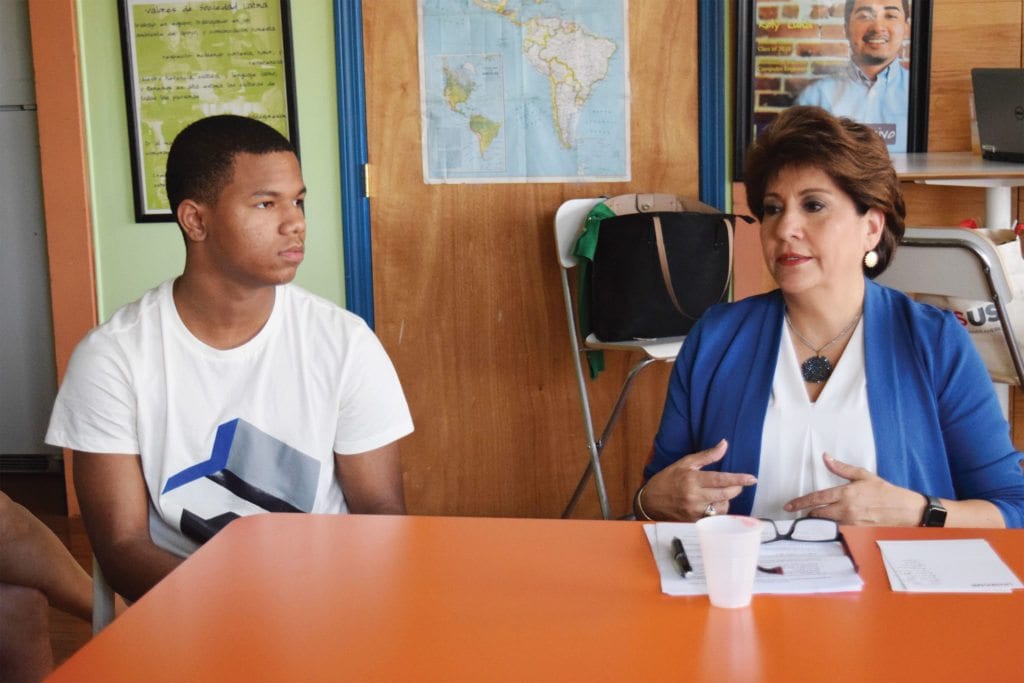
Nearly 60 percent of Latinos are millennials or younger, according to a 2016 Pew Research Center study. With this statistic in mind, Sociedad Latina hosted a roundtable discussion between Boston youth leaders and UnidosUS President and CEO Janet Murguía to hear their perspectives on the national and local climate for enacting policy change.
Sociedad Latina is a Mission Hill-based nonprofit organization for Latino youth and families and UnidosUS is the largest national Hispanic civil rights advocacy organization.
The participating teens are high school students and active members of their communities and schools. They included Joshua Rivera, 16; Everett Baez, 18; Diana Palicio, 17; and Abraham Sillah, 18. Their conversation with Murguía touched on issues of immigration, housing and college affordability, gun violence in schools and youth job opportunities.
“I want to make sure I’m listening,” said Murguía. “As Latinos in the U.S., we’re a young community. There are 1 million Hispanics who turn 18 every year. A lot could be changed if we elect the people who care about the issues we care about.”
As juniors and seniors in high school, the teens spoke about what their future plans would be after graduating, whether they would be able to afford college and whether their immigration status would impede them in the application process.
The discussion then switched to a broader lens: how to straddle two worlds and two cultures as U.S. citizens born to immigrant parents or as immigrants themselves acclimating to American culture and speaking English.
“Some people who are really focused on the American Dream, they start to lose their heritage,” said Sillah who has Haitian and Dominican parents. “When I’m with my family, I’m close to that culture but when I’m outside, looking for jobs, I’m more Americanized.”
Palicio, whose family is from Colombia, said she likes that she is a part of two different worlds. “It’s nice to have both. There are more opportunities when you’re bilingual,” she said.
Baez said, “Being American opens a lot of opportunities and your culture is what makes you unique.”
Baez also told Murguía that as a country, the United States should have more community programming and mentorship opportunities for Latino teens as such programming has opened many doors for him.
Sillah agreed. “Opportunities have been presented to me because of school and Sociedad Latina, which has shielded me in a way from discrimination,” he said when the teens began talking about their experiences with racism.
Murguía said that as CEO of UnidosUS, she makes a point to travel all over the country at least twice a month to visit partnering organizations in their local communities.
“There is the uniqueness of this area, where gentrification is a particular issue,” she said of Boston. “I have not necessarily heard this in places like Arizona.”
Alexandra Oliver-Davila, executive director of Sociedad Latina, called the location of her organization a double-edged sword.
“We’re located in the economic center of Boston, which comes with both positives and negatives,” she said. “The positive is that we have connections with all the nearby hospitals for programming or internship opportunities. The bad are things like violence and gentrification.”
On the topic of gentrification, Oliver-Davila said, “Latinos in Boston, we have grown the economy and yet we are being displaced.”
Murguía also spoke to the teens about gun violence in schools and asked if they perceived the issue as a threat in their daily lives.
Rivera said that at Madison Park Technical Vocational High School, students’ backpacks and bags are checked every day. This happened only occasionally in the past, but has changed within the last year. However, he said that although gun violence is an issue in the surrounding area, it hasn’t been inside schools.
Murguía theorized that because Massachusetts has relatively strict gun laws, the teens did not have a lot to say on the topic of gun violence, currently an explosive issue nationwide, but she also wondered whether it was for a different reason.
“When we spoke about their schools checking bags, I got a sense that maybe they are desensitized or even normalized by gun violence in schools,” she said.
“Through the conversations I have with teens, I take the information to various institutions to advocate for policy change,” said Murguía. “For example, we want to create a financial literacy and homeownership program with Sociedad Latina and partner with financial institutions to open up access to mortgages.”
Murguía grew up in Kansas, raised by her Mexican immigrant parents along with her six brothers and sisters. Her father worked in a steel plant for over three decades. “I didn’t have my own bed until I went off to college at the University of Kansas,” she told the teens.
Murguía previously served as legislative counsel to former Kansas Congressman Jim Slattery, then as deputy assistant to President Bill Clinton. Her twin sister Mary and brother Carlos are federal judges.
Both Sociedad Latina and UnidosUS are celebrating their 50th year of working with Latino families on issues of immigration, healthcare access, education, civil rights and civic engagement.






